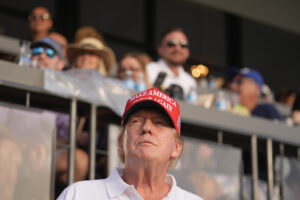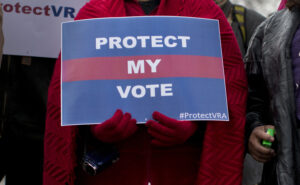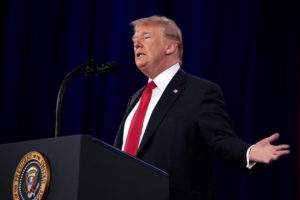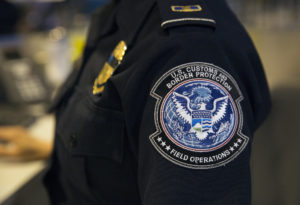Nine Secret Bush-Era Documents Released
The Justice Department has released nine secret memos and opinions written by the Office of Legal Counsel that authorized some of the Bush administration's unlawful national security policies.
From an ACLU press release: The Justice Department has released nine secret memos and opinions written by the Office of Legal Counsel (OLC) that authorized some of the Bush administration’s unlawful national security policies, including a memo written by OLC lawyer John Yoo that argued the Fourth Amendment does not apply to military activities inside the United States.
The memos, which are available at the United States Department of Justice web site, were released after heavy public pressure surrounding a lawsuit brought by the ACLU. Notice: The files are in .PDF form.
Memorandum Regarding Swift Justice Authorization Act (04-08-2002)
Memorandum Regarding Determination of Enemy Belligerency and Military Detention (06-08-2002)
Also, for a good analysis on what these memos mean and their importance in the profound restructuring of government that occurred under the Bush Administration, read the below piece by Marjorie Cohn:
Memos Provide Blueprint for Police State
By Marjorie Cohn
Seven newly released memos from the Bush Justice Department reveal a concerted strategy to cloak the President with power to override the Constitution. The memos provide “legal” rationales for the President to suspend freedom of speech and press; order warrantless searches and seizures, including wiretaps of U.S. citizens; lock up U.S. citizens indefinitely in the United States without criminal charges; send suspected terrorists to other countries where they will likely be tortured; and unilaterally abrogate treaties. According to the reasoning in the memos, Congress has no role to check and balance the executive. That is the definition of a police state.
Who wrote these memos? All but one were crafted in whole or in part by the infamous John Yoo and Jay Bybee, authors of the so-called “torture memos” that redefined torture much more narrowly than the U.S. definition of torture, and counseled the President how to torture and get away with it. In one memo, Yoo said the Justice Department would not enforce U.S. laws against torture, assault, maiming and stalking, in the detention and interrogation of enemy combatants.
What does the federal maiming statute prohibit? It makes it a crime for someone “with the intent to torture, maim, or disfigure” to “cut, bite, or slit the nose, ear or lip, or cut out or disable the tongue, or put out or destroy an eye, or cut off or disable a limb or any member of another person.” It further prohibits individuals from “throwing or pouring upon another person any scalding water, corrosive acid, or caustic substance” with like intent.
The two torture memos were later withdrawn after they became public because their legal reasoning was clearly defective. But they remained in effect long enough to authorize the torture and abuse of many prisoners in U.S. custody.
The seven memos just made public were also eventually disavowed, several years after they were written. Steven Bradbury, the Principal Deputy Assistant Attorney General in Bush’s Department of Justice, issued two disclaimer memos – on October 6, 2008 and January 15, 2009 – that said the assertions in those seven memos did “not reflect the current views of this Office.” Why Bradbury waited until Bush was almost out of office to issue the disclaimers remains a mystery. Some speculate that Bradbury, knowing the new administration would likely release the memos, was trying to cover his backside.
Indeed, Yoo, Bybee and Bradbury are the three former Justice Department lawyers that the Office of Professional Responsibility singled out for criticism in its still unreleased report. The OPR could refer these lawyers for state bar discipline or even recommend criminal charges against them.
In his memos, Yoo justified giving unchecked authority to the President because the United States was in a “state of armed conflict.” Yoo wrote, “First Amendment speech and press rights may also be subordinated to the overriding need to wage war successfully.” Yoo made the preposterous argument that since deadly force could legitimately be used in self-defense in criminal cases, the President could suspend the Fourth Amendment because privacy rights are less serious than protection from the use of deadly force.
Bybee wrote in one of the memos that nothing can stop the President from sending al Qaeda and Taliban prisoners captured overseas to third countries, as long as he doesn’t intend for them to be tortured. But the Convention Against Torture, to which the United States is a party, says that no country can expel, return or extradite a person to another country “where there are substantial grounds for believing that he would be in danger of being subjected to torture.” Bybee claimed the Torture Convention didn’t apply extraterritorially, a proposition roundly debunked by reputable scholars. The Bush administration reportedly engaged in this practice of extraordinary rendition 100 to 150 times as of March 2005.
The same day that Attorney General Eric Holder released the memos, the government revealed that the CIA had destroyed 92 videotapes of harsh interrogations of Abu Zubaida and Abd al Rahim al Nashiri, both of whom were subjected to waterboarding. The memo that authorized the CIA to waterboard, written the same day as one of Yoo/Bybee’s torture memos, has not yet been released.
Bush insisted that Zubaida was a dangerous terrorist, in spite of the contention of one of the FBI’s leading al Qaeda experts that Zubaida was schizophrenic, a bit player in the organization. Under torture, Zubaida admitted to everything under the sun – his information was virtually worthless.
There are more memos yet to be released. They will invariably implicate Bush officials and lawyers in the commission of torture, illegal surveillance, extraordinary rendition, and other violations of the law.
Meanwhile, John Yoo remains on the faculty of Berkeley Law School and Jay Bybee is a federal judge on the Ninth Circuit Court of Appeals. These men, who advised Bush on how to create a police state, should be investigated, prosecuted, and disbarred. Yoo should be fired and Bybee impeached.
Marjorie Cohn is a professor at Thomas Jefferson School of Law and president of the National Lawyers Guild. She is the author of “Cowboy Republic: Six Ways the Bush Gang Has Defied the Law” and co-author of “Rules of Disengagement: The Politics and Honor of Military Dissent,” which will be published this spring. Her articles are archived at www.marjoriecohn.com.
Your support matters…Independent journalism is under threat and overshadowed by heavily funded mainstream media.
You can help level the playing field. Become a member.
Your tax-deductible contribution keeps us digging beneath the headlines to give you thought-provoking, investigative reporting and analysis that unearths what's really happening- without compromise.
Give today to support our courageous, independent journalists.






You need to be a supporter to comment.
There are currently no responses to this article.
Be the first to respond.